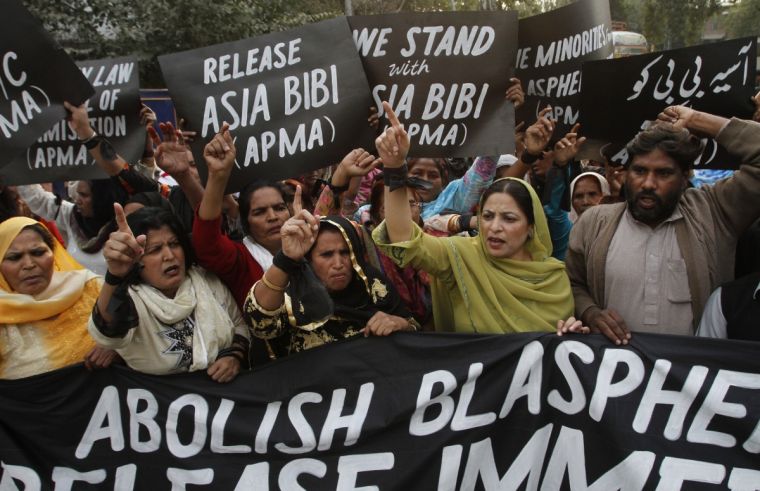Blasphemy Laws in Pakistan
قوانين التجديف في باكستان
A. Z. Mohamed/Gatestone Institute/July 03/18
Many extremist Muslims are aiming at even more government submission to sharia through intimidation and terror.
Christians and Ahmadis continue to raise concerns regarding the government’s failure to safeguard minority rights, as well as the government’s persistent discrimination against religious minorities.
Pakistan is also where Muslim militants, such as the Pakistani Taliban, carry out assassinations and terrorist attacks. It seems no one is there to stop them.
On May 6, Ahsan Iqbal, Pakistan’s Minister of the Interior, was shot during a rally in his own constituency, in the province of Punjab. Fortunately, he survived the attack, but the bullet in his abdomen could not be removed. “The bullet lodged in my body… will keep reminding me of the impending need to remove the seeds of hatred sowed in the country,” Iqbal said.
An initial report suggested that the main suspect, Abid Hussain, 21, had carefully planned the attack; recently, Pakistan’s Anti-Terrorism Court issued an 8-day judicial remand of four possible accomplices.
On May 6, Pakistan’s Minister of the Interior, Ahsan Iqbal (pictured at left), was shot and wounded by an Islamist extremist during a rally in Punjab. (Image source: USAID Pakistan/Wikimedia Commons)
According to other reports, Hussain is linked to Tehreek-e-Labbaik Pakistan (TLP) — also known as Tehreek-e-Labbaik Ya Rasool Allah (“Movement of the Prophet’s Followers”). TLP is a new Sunni extremist party known for aggressively calling for enforcing Pakistan’s blasphemy laws, which can carry the death penalty, and for opposing any relaxation of these laws.
Many fear that this assault is not an isolated incident and that other members of the cabinet are on the TLP’s hit list. This apprehension, however, does not mean that the government is against sharia or blasphemy laws, or is even thinking of reforming them. Many extremist Muslims are aiming at even more government submission to sharia through intimidation and terror.
Extremist Muslims in Pakistan have been successful in achieving their objectives. according to the U.S. Department of State’s 2017 Report on International Religious Freedom:
“The [Pakistani] courts continued to enforce blasphemy laws, the punishment for which ranges from life in prison to the death sentence for a range of charges, including ‘defiling the Prophet Muhammad.'”
According to reports from civil society organizations, in 2017, there were at least 50 individuals imprisoned on blasphemy charges, at least 17 of whom had received death sentences, In addition, the report added, the police registered at least 17 new cases under the blasphemy laws against still other individuals.
Pakistan’s TLP party activism is just one example of how extremist Muslims and official complicity combine to perpetuate sharia and blasphemy laws. TLP itself was apparently inspired by a “blasphemy killer.” The party “was born out of a protest movement supporting Mumtaz Qadri, a bodyguard of the governor of Punjab who gunned down his boss in 2011 over his call to relax Pakistan’s draconian blasphemy laws,” Reuters reported.
In October 2017, Pakistan’s president, Mamnoon Hussain, signed into law a bill that changed an electoral oath which affirmed the belief that the Prophet Muhammed is the final prophet of Islam to a “declaration” and abolished separate voter lists for Ahmadi Muslims, whom many Muslims consider non-Muslim, as Ahmadis regard Mirza Ghulam Ahmad (1835-1908) as their Mahdi (Messiah). In 1974, a constitutional amendment introduced by the prime minister at the time, Zulfikar Ali Bhutto, had declared the Ahmadiyya community a non-Muslim minority; and in 1984, President Zia-ul Haq issued Ordinance XX which makes it a criminal offense for Ahmadis to call themselves Muslims, and to practice or propagate their faith.
In any event, the law sparked weeks of protests, led by Tehreek-e-Labbaik Pakistan members, against the government. The TLP accused then-Minister for Law and Justice, Zahid Hamid, of blasphemy and demanded his resignation. The government succumbed to pressure by extremist Muslims, and attributed the change in the oath to “clerical error.” Parliament reversed the provisions; Hamid was forced to resign and the government gave assurances that Asia Bibi, a Christian mother of five with a highly questionable blasphemy conviction, would not be sent abroad. Notably, Qadri had apparently also murdered governor Salman Taseer for speaking against a death sentence on Asia Bibi.
More appalling is what the U.S. Department of State report said: that government officials — under pressure from the extremist Muslims’ protests of October 2017 — and probably to deny any support to Ahmadis — had engaged in anti-Ahmadi rhetoric and attended events that Ahmadis said incited violence against members of their community. The Ahmadiyya Muslim Community leaders and human rights organizations “continued to express concerns about the government’s targeting of Ahmadis for blasphemy, and Ahmadis continued to be affected by discriminatory and ambiguous legislation that denied them basic rights,” the report added.
Christians and Ahmadi Muslims are not by any means exceptional: members of all religious minority communities in Pakistan are distressed that the government submitted to Tehreek-e-Labbaik party and other Islamists’ pressure. Christians and Ahmadis continue to raise concerns regarding the government’s failure to safeguard minority rights as well as its persistent discrimination against religious minorities. Authorities have also often failed to intervene during episodes of violence against religious minorities, and the police have often failed to arrest perpetrators of these abuses.
In his condemnation of the assassination attempt of the Minister of Interior, Rizvi, TLP’s leader, emphasized that his party is waging an unarmed struggle to bring “the Prophet’s religion to the throne,” in a way that clearly identifies his party role in achieving Islamists’ ultimate goal of al-hakemyah of Allah (the sovereignty of God and sharia law), a role that consists in spreading narratives such as the supremacy of Islam, the supposed religion of truth, over all other world religions (Quran 3:19); the supposed supremacy of sharia over all man-made laws, and that the Christians and Jews are supposedly conspiring against Islam and Muslims (Quran 2:109). Extremist Muslims, like Tehreek-e-Labbaik, have been able to plant seeds of intolerance, hatred and fear, lionize terrorists and lead protests to impose sharia and blasphemy laws.
Within this context of Islamists’ “unarmed struggle,” the goal of bringing “the Prophet’s religion to the throne” is likely to take place in a country where the government, under religious pressure, was unable to defend an electoral reform bill enacted by the president last October. The government also has not followed most of the instructions issued four years ago by Pakistan’s Supreme Court to protect religious minorities after a terrorist bomber murdered 127 innocent people at a church. Pakistan is also where Muslim militants, such as the Pakistani Taliban, carry out assassinations and terrorist attacks. It seems no one is there to stop them.
*A. Z. Mohamed is a Muslim born and raised in the Middle East.
© 2018 Gatestone Institute. All rights reserved. The articles printed here do not necessarily reflect the views of the Editors or of Gatestone Institute. No part of the Gatestone website or any of its contents may be reproduced, copied or modified, without the prior written consent of Gatestone Institute.
https://www.gatestoneinstitute.org/12576/blasphemy-laws-pakistan
Europe: “The Vision is an Islamic State”
أوروبا: الرؤية هي لدولة إسلامية
Judith Bergman/Gatestone Institute/July 03/18
https://www.gatestoneinstitute.org/12619/europe-islamic-state
“The growing religiousness is not an expression of marginalization. We are talking about people who are well-integrated, but who want to be religious”. — Professor Viggo Mortensen.
“The vision is an Islamic state — Islamic society… Muslims will prefer sharia rule. But the vision for twenty years from now is for sharia law to be part of Germany, that sharia will be institutionalized in the state itself”. — “Yusuf”, in a documentary series, False Identity.
“I will pick them one by one — I will start with people around me… If every Muslim would do the same in his surroundings, it can happen with no problem… you don’t confront him [the German] with force; you do it slowly… There will be clashes, but slowly the clashes will subside, as people will accept reality.” — “Yusuf”, in a documentary series, False Identity.
Europe will still exist but, as with the great Christian Byzantine Empire that is now Turkey, will it still embody Judeo-Christian civilization?
A Dutch government report published in June showed that Muslims in the Netherlands are becoming more religious. The report, based on information from 2006-2015, is a study of more than 7,249 Dutch nationals with Moroccan and Turkish roots. Two thirds of the Muslims in the Netherlands are from Turkey or Morocco.
According to the report, 78% of Moroccan Muslims pray five times a day, as do 33% of Turkish Muslims. Approximately 40% of both groups visit a mosque at least once a week. More young Moroccan women wear a headscarf (up from 64% in 2006 to 78% in 2015) and large majorities of both groups eat halal (93% of Moroccan Muslims and 80% of Turkish Muslims). 96% of Moroccan Muslims say that faith is a very important part of their lives, whereas the number is 89% for Turkish Muslims. The number of Dutch Moroccan Muslims who can be described as strictly adhering to Islam has increased from 77% in 2006, to 84% in 2015. For Turkish Muslims, the numbers have increased from 37% to 45%. There are few secular Muslims — 7% among Turkish Muslims, 2% among Moroccan Muslims.
In Denmark, the trend of Muslims becoming more religious was apparent as early as 2004, when a poll showed that Muslims were becoming more religious than their parents, especially “young, well-educated and well-integrated women”. At the time, Professor Viggo Mortensen said, “The growing religiousness is not an expression of marginalization. We are talking about people who are well-integrated, but who want to be religious”.
A more detailed Danish poll from 2015 showed that Muslims had become more religious since a similar poll taken in 2006: In 2006, 37% prayed five times a day, whereas the number had gone up to 50% in 2015. In 2006, 63% believed that the Koran should be followed to the letter; in 2015, it was 77%. Brian Arly Jacobsen, a sociologist of religion from the University of Copenhagen, was surprised by the results. “With time we would expect [that Muslims] would become more like the rest of the Danes, who are not particularly active in the religious sphere,” he said. Jacobsen thought that a possible explanation might have been the 20-30 new mosques that were built in the decade preceding 2015.
The trends expressed by these polls are corroborated by studies and polls showing that many Muslims in Europe want to live under sharia law. According to a 2014 study of Moroccan and Turkish Muslims in Germany, France, the Netherlands, Belgium, Austria and Sweden, an average of almost 60% of the Muslims polled agreed that Muslims should return to the roots of Islam. 75% thought there is only one interpretation of the Koran possible, and 65% said that Sharia is more important to them than the laws of the country in which they live. A 2016 UK poll showed that 43% of British Muslims “believed that parts of the Islamic legal system should replace British law while only 22 per cent opposed the idea”. In a 2017 study, which included a poll of 400 Belgian Muslims, 29% said they believe the laws of Islam to be superior to Belgian law, and 34% said they “would definitely prefer a political system inspired by the Quran”.
According to a 2014 study of Moroccan and Turkish Muslims in Germany, France, the Netherlands, Belgium, Austria and Sweden, an average of almost 60% of the Muslims polled agreed that Muslims should return to the roots of Islam, and 65% said that Sharia is more important to them than the laws of the country in which they live. Pictured: Friday prayers at the IZW Mosque in Vienna, Austria. (Photo by Thomas Kronsteiner/Getty Images)
The more than two million predominantly Muslim migrants that have arrived in Europe in recent years are only reinforcing the trend of growing Muslim religiosity on the continent. A 2017 study of predominantly Afghan asylum seekers in the Austrian city of Graz showed that the asylum seekers, mostly men under the age of 30, were all in favor of preserving their traditional Islamic values with 70% going to the mosque every Friday for prayers. The women were even more religious, with 62.6% praying five times a day, notably more than the men (39.7%). In addition, 66.3% of the women wore a headscarf in public. Half of the migrants said that religion now plays a larger role in their daily lives in Europe than it did in their native country, and 51.6% of the interviewees said that the supremacy of Islam over other religions was undisputed.
The tendency of many Muslims to become more religious once they arrived in Europe was also on display in a new documentary series, “False Identity,” by Arabic-speaking journalist Zvi Yehezkeli, who went undercover to report on the activities of the Muslim Brotherhood in Europe and the US. In Germany, he encountered two young Muslims from Syria, who came to Germany via Kosovo, where they received help from a “British Islamic organization”. They had left Syria as secular Muslims, but on the way to Germany they lived for a year in Pristina, Kosovo, where, according to Yehezkeli, “Muslim Brotherhood organizations are active in helping refugees while turning them into devout Muslims. Ahmed and Yusuf arrived [in Germany] already praying five times a day”.[1]
According to Ahmed:
“When I left Syria, mentally I felt more relaxed. The Islamic charity organization played an important role in this. Look, the first time you meet them they start helping you. You sit, you stare at them, they pray in front of you and here I am a Muslim, studied the Quran, yet don’t pray. Suddenly I find myself alone asking, Why shouldn’t I pray like all others?”
Yehezkeli asked them what their dream is. “The vision is an Islamic state — Islamic society,” said Yusuf, “Muslims will prefer sharia rule. But the vision for twenty years from now is for sharia law to be part of Germany, that sharia will be institutionalized in the state itself”.
In contrast to the growing religiousness of Muslims in Europe, Christians are becoming less religious. In a study of young Europeans, aged 16-29, published in March and based on 2014-2016 data, the author, Stephen Bullivant, a professor of theology and the sociology of religion at St Mary’s University in London, concluded:
“With some notable exceptions, young adults increasingly are not identifying with or practicing religion… Christianity as a default, as a norm, is gone, and probably gone for good — or at least for the next 100 years”.
According to the study, between 70% and 80% of young adults in Estonia, Sweden and the Netherlands categorize themselves as non-religious. Between 64% and 70% of young adults consider themselves non-religious in France, Belgium, Hungary and the UK. The most religious youths were to be found in Poland, where only 17% of young adults defined themselves as non-religious, followed by Lithuania with 25%.
Young Muslims like Yusuf and Ahmed from Syria say they want to spread Islam by converting Europeans, also known as dawa. They are themselves perfect examples of having been at the receiving end of dawa — becoming devout Muslims through the Islamic organization in Kosovo and now engaging in dawa themselves. “I will pick them one by one — I will start with people around me. They will listen. If every Muslim would do the same in his surroundings, it can happen with no problem,” said Yusuf. Asked if the Germans might resist dawa, he said:
“You don’t confront him [the German] with force, you do it slowly… There will be clashes, but slowly the clashes will subside, as people will accept reality. There is no escape; every change involves clashes”.
Given young Europeans’ lack of a religious identity and the vacuum left by the departure of Christianity from the lives of the majority, one has to wonder how sturdy their ability will be to withstand such attempts at proselytizing. Europe will still exist but, as with the great Christian Byzantine Empire that is now Turkey, will it still embody Judeo-Christian civilization?
*Judith Bergman is a columnist, lawyer and political analyst.
[1] The quote begins at 21:24 in the documentary. The statements by Yusuf and Ahmed follow immediately after.
© 2018 Gatestone Institute. All rights reserved. The articles printed here do not necessarily reflect the views of the Editors or of Gatestone Institute. No part of the Gatestone website or any of its contents may be reproduced, copied or modified, without the prior written consent of Gatestone Institute.























